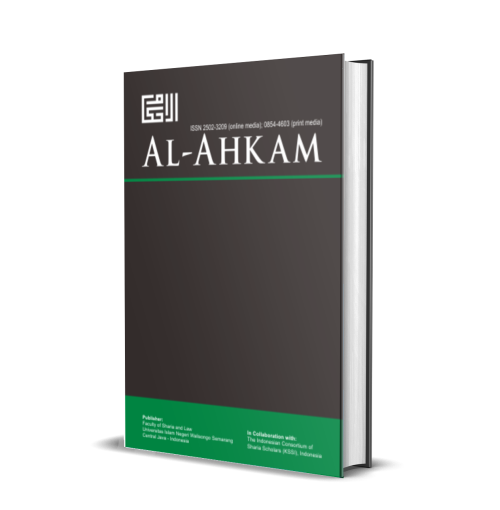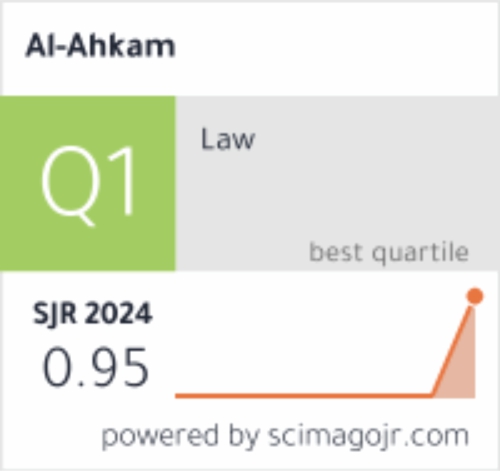Contribution Model of al-Mas'ūliyyah al-Jinā'iyyah in the Formulation of Criminal Liability in Indonesia’s New Criminal Code
DOI:
https://doi.org/10.21580/ahkam.2024.34.2.22592Keywords:
criminal liability, contribution, dialectic, New Criminal CodeAbstract
The evolution of criminal law in Indonesia reflects a complex interplay between indigenous legal traditions and external influences, including Islamic law. This article examines the contribution model of al-mas'ūliyyah al-jinā'iyyah (criminal liability in Islamic law) to formulating criminal liability in Indonesia’s New Criminal Code (KUHP Baru). The study adopts a qualitative research method, utilizing a comparative legal analysis framework to explore the dialectic between Islamic criminal law and the New Criminal Code. Data sources include classical legal texts, the book of Qur’anic exegesis and Hadith interpretations, legislative documents related to the New Criminal Code, academic literature, legal commentaries, and jurisprudential analyses. Through this method, the study identifies an elegant interplay between the principles of ḍarar (harm) and the fundamental criminal liability provisions in both systems. This study's findings reveal significant similarities and key differences, such as the role of intent, the typology of legal subjects, and the broader scope of liability for corporate crimes under the New Criminal Code (KUHP Baru). This article concludes that the contribution of al-mas'ūliyyah al-jinā'iyyah to the New Criminal Code lies primarily at the level of values while highlighting the potential for further alignment in specific areas.
Downloads
References
Abdillah, Junaidi. “Diskursus Hudûd dalam Studi Hukum Islam (Melacak Evolusi Rumusan Hudûd).” al-Ihkam: Jurnal Hukum & Pranata Sosial 13, no. 2 (2018): 334–63. https://doi.org/10.19105/al-ihkam.v13i2.1881.
Ahmad, Amrullah, M. Said Munji, Muhammad Djazuli, Ahmad Kamil, and Lukman Hakiem. Dimensi Hukum Islam dalam Sistem Hukum Nasional: Mengenang 65 Th. Prof. Dr. Busthanul Arifin, SH. Jakarta: Gema Insani Press, 1996.
Ahnaf, Mohammad Iqbal. “Tiga Jalan Islam Politik di Indonesia: Reformasi, Refolusi dan Revolusi.” Wawasan: Jurnal Ilmiah Agama dan Sosial Budaya 1, no. 2 (2016): 127–40. https://doi.org/10.15575/jw.v1i2.728.
Amruzi, Muhammad Fahmi Al. “Membumikan Hukum Islam di Indonesia.” al-Banjari: Jurnal Ilmiah Ilmu-Ilmu Keislaman 14, no. 2 (2016): 172–84. https://doi.org/10.18592/al-banjari.v14i2.656.
Ariefulloh, Ariefulloh, Hibnu Nugroho, Angkasa Angkasa, and Riris Ardhanariswari. “Restorative Justice-Based Criminal Case Resolution in Salatiga, Indonesia: Islamic Law Perspective and Legal Objectives.” Ijtihad: Jurnal Wacana Hukum Islam dan Kemanusiaan 23, no. 1 (2023): 19–36. https://doi.org/10.18326/ijtihad.v23i1.19-36.
Arifin, Busthanul. Pelembagaan Hukum Islam di Indonesia: Akar Sejarah, Hambatan dan Prospeknya. Jakarta: Gema Insani Press, 2006.
Ariyanti, Vivi. “Konsep Perlindungan Korban dalam Sistem Peradilan Pidana Nasional dan Sistem Hukum Pidana Islam.” al-Manahij: Jurnal Kajian Hukum Islam 13, no. 1 (2019): 33–48. https://doi.org/10.24090/mnh.v0i1.2224.
Candra, Septa. “Pembaharuan Hukum Pidana; Konsep Pertanggungjawaban Pidana dalam Hukum Pidana Nasional yang akan Datang.” Jurnal Cita Hukum 1, no. 1 (2013): 39–58. https://doi.org/10.15408/jch.v1i1.2979.
Djafri, Muhammad Taufan, Kurniati Kurniati, and Misbahuddin Misbahuddin. “Pertimbangan Sosiologis Penegakan dan Pengamalan Hukum Islam di Indonesia.” Bustanul Fuqaha: Jurnal Bidang Hukum Islam 3, no. 3 (2022): 339–49. https://doi.org/10.36701/bustanul.v3i3.666.
Effendy, Bahtiar. Islam dan Negara: Transformasi Gagasan dan Praktik Politik Islam di Indonesia. Jakarta: Paramadina, 2009.
Fathuri, Fathuri. “Majnûn dalam al-Qur’an (Perspektif Michel Foucault)." [Master Thesis]. PTIQ Jakarta, 2022.
Friedman, Lawrence M. American Law. New York: WW. Norton & Company, 1984.
Gunawan, Hendra. “Karakteristik Hukum Islam.” Jurnal al-Maqasid: Jurnal Ilmu Kesyariahan dan Keperdataan 4, no. 2 (2018): 105–25. https://jurnal.uinsyahada.ac.id/index.php/almaqasid/article/view/1429.
Hapsin, Abu, and Nazar Nurdin. “Diat and Peace Money in the Crime of Culpable Homicide.” al-Ahkam 32, no. 2 (2022): 189–210. https://doi.org/10.21580/ahkam.2022.32.2.12413.
Manan, Abdul. Reformasi Hukum Islam di Indonesia. Jakarta: Rajawali Press, 2016.
Meirison, Meirison, Desmadi Saharuddin, and Husnul Fatarib. “The Dynamics of Islamic Jurisprudence in The Eyes of Contemporary Muslims.” el-Mashlahah 12, no. 1 (2022): 70–83. https://doi.org/10.23971/elma.v12i1.3939.
Muchsin. Masa Depan Hukum Islam di Indonesia. Jakarta: BP. Islam, 2014.
Mudzakir, M. “Integrasi Hukum Islam dalam Hukum Nasional: Upaya Restrukturisasi Perundang-Undangan Nasional.” Mazhabuna 2, no. 2 (2003): 23–41.
al-Munawar, Said Agil Husin. Hukum Islam dan Plularitas Sosial. Jakarta: Penamadani, 2014.
Nur, Iffatin, Syahrul Adam, and M. Ngizzul Muttaqien. “Maqāṣid al-Sharī‘at: The Main Reference and Ethical-Spiritual Foundation for the Dynamization Process of Islamic Law.” Ahkam: Jurnal Ilmu Syariah 20, no. 2 (2020): 331–60. https://doi.org/10.15408/ajis.v20i2.18333.
Putera, Rachmat Panca. “Pemikiran Politik Islam di Indonesia: Dari Formalistik menuju ke Substantif.” Ri’ayah: Jurnal Sosial dan Keagamaan 3, no. 1 (2018): 57–68. https://e-journal.metrouniv.ac.id/riayah/article/view/1179.
Rosyadi, A. Rahmat, and Rais Ahmad. Formalisasi Syariat Islam dalam Perspektif Tata Hukum Indonesia. Bogor: Ghalia Indonesia, 2006.
Roza, Ahmad Fadhly. “Analisis Unsur Perbuatan Suap (Risywah) Berdasarkan UU No. 20 Tahun 2001 tentang Perubahan UU No. 31 Tahun 1999 tentang Pemberantasan Tindak Pidana Korupsi dalam Perspektif Hukum Islam di Pengadilan Negeri Medan." [Doctoral Thesis]. UIN Sumatera Utara, 2020.
Sakhowi, Sakhowi. “Taqnīn Method of Qānūn Jināyah and Problems of Its Implementation in Aceh, Indonesia.” JIL: Journal of Islamic Law 3, no. 2 (2022): 193–211. https://doi.org/10.24260/jil.v3i2.817.
al-Ṣan’anī, Muḥammad bin Ismā’īl. Subul al-Salām. Cairo: Muṣtafā al-Bābi al-Halabi, 1960.
Santoso, Topo. “Aspek Pidana dan Pemidanaan dalam KUHP Baru.” In Sosialisasi KUHP Baru - Via Zoom Meeting. Denpasar: BPHN, 2023.
Santoso, Topo. Membumikan Hukum Pidana Islam: Penegakan Syaiat dalam Wacana dan Agenda. Jakarta: Gema Insani Press, 2017.
ash-Shiddiqie, Jimly. Pembaharuan Hukum Pidana Indonesia: Studi tentang Bentuk-bentuk Pidana dalam Tradisi Hukum Fiqh dan Relevansinya bagi Usaha Pembaharuan KUHP Nasional. Bandung: Angkasa, 2016.
Sosiawan, Ulang Mangun. “Perspektif Restorative Justice sebagai Wujud Perlindungan Anak yang Berhadapan dengan Hukum (Perspective of Restorative Justice as a Children Protection Against the Law).” Jurnal Penelitian Hukum De Jure 16, no. 4 (2017): 425–38. https://doi.org/10.30641/dejure.2016.V16.425-438.
Sudhirta, I Wayan. “Menyambut KUHP Baru.” In Sosialisasi KUHP Baru - Via Zoom Meeting. Denpasar: BPHN, 2023.
Supardin, and Abdul Syatar. “Adultery Criminalization Spirit in Islamic Criminal Law: Alternatives in Indonesia’s Positive Legal System Reform.” Samarah 5, no. 2 (2021): 913–27. https://doi.org/10.22373/sjhk.v5i2.9353.
Surur, Nahar. “Pemidanaan Nikah Sirri dalam RUU HMPA (Pasal 143) Perspektif Maṣlāḥah Mursalaḥ.” el-Usrah 5, no. 2 (2022): 398–408. https://doi.org/10.22373/ujhk.v5i2.14970.
Suryani, Irma, Mohamad Hidayat Muhtar, Yogi Muhammad Rahman, Belardo Prasetya Mega Jaya, and Awad al Khalaf. “Integration of Islamic Law in Regional Development in Indonesia.” JURIS (Jurnal Ilmiah Syariah) 22, no. 1 (2023): 1–11. https://doi.org/10.31958/juris.v22i1.8770.
Syam, Syafruddin. “Studi Siyasah dalam Islam: Metode Pemikirandan Penerapannya.” al-Kaffah: Jurnal Kajian Nilai-nilai Keislaman 10, no. 2 (2022): 275–98. https://jurnalalkaffah.or.id/index.php/alkaffah/article/view/54.
Syaukani, Imam. Rekonstruksi Epistemologi Hukum Islam Indonesia. Jakarta: RajaGrafindo Persada, 2006.
Tim Ahli Pembahasan UU KUHP. “Kebaruan Hukum Pidana.” In Sosialisasi KUHP Baru - Via Zoom Meeting. Denpasar: BPHN, 2023.
Umar, M. Hasbi, and Bahrul Ma’ani. “Urgensi Hak dan Perlindungan Anak dalam Perspektif Maqashid al-Syariah.” al-Risalah: Forum Kajian Hukum dan Sosial Kemasyarakatan 17, no. 2 (2018): 19–35. https://doi.org/10.30631/alrisalah.v17i02.64.
Downloads
Published
How to Cite
Issue
Section
License
Copyright (c) 2024 Al-Ahkam

This work is licensed under a Creative Commons Attribution-ShareAlike 4.0 International License.
By submitting an article to the journal, the author(s) agree to transfer the published article's copyright to the journal, which will act as the publisher. This means the journal will have the right to publish the article in various forms, including reprints. The journal will maintain the publishing rights to the published articles.
In line with the license, authors and third parties (readers, researchers, and others) are allowed to share and adapt the material. In addition, the material must be given appropriate credit, provided with a link to the license, and indicated if changes were made. If authors remix, transform or build upon the material, authors must distribute their contributions under the same license as the original.



